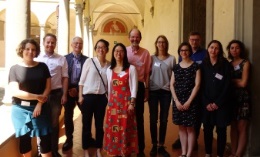The WelfSoc “Our Children’s Europe” project presented eight papers at the final conference of the Norface Welfare Futures programme at the European University Institute in Florence on 23-25 May. The project explores what people think will happen to welfare state policy over the next 25 year, and the policies they would like to see.
The papers covered a wide range of issues from the welfare nationalist response to immigration to the increasingly salient debates about conditionality and deservingness, to the paradox between recognition of the needs of refugees and disquiet about immigrants who enter a country because they hope for a better life, to work on redistribution and conditionality, to care provision for both children and older people, to the values that underlie attitudes and constitute a distinctive national moral economies, to the growing importance of employers’ involvement in welfare and the innovative qualitative methods pursued by the project teams.
The overall outcome was a strong impression of the range and complexity of public attitudes, of the importance of immigration issues and of the way policies that account for a relatively small proportion of national budgets such as means-tested provision play a disproportionate role in debates. There is some evidence of a shift in emphasis away from policies directed at the needs of older people (pensions and health care) to the child care, employment and training policies of importance to those at an earlier life-stage, particularly in the richer countries.
See the project website for more information.

